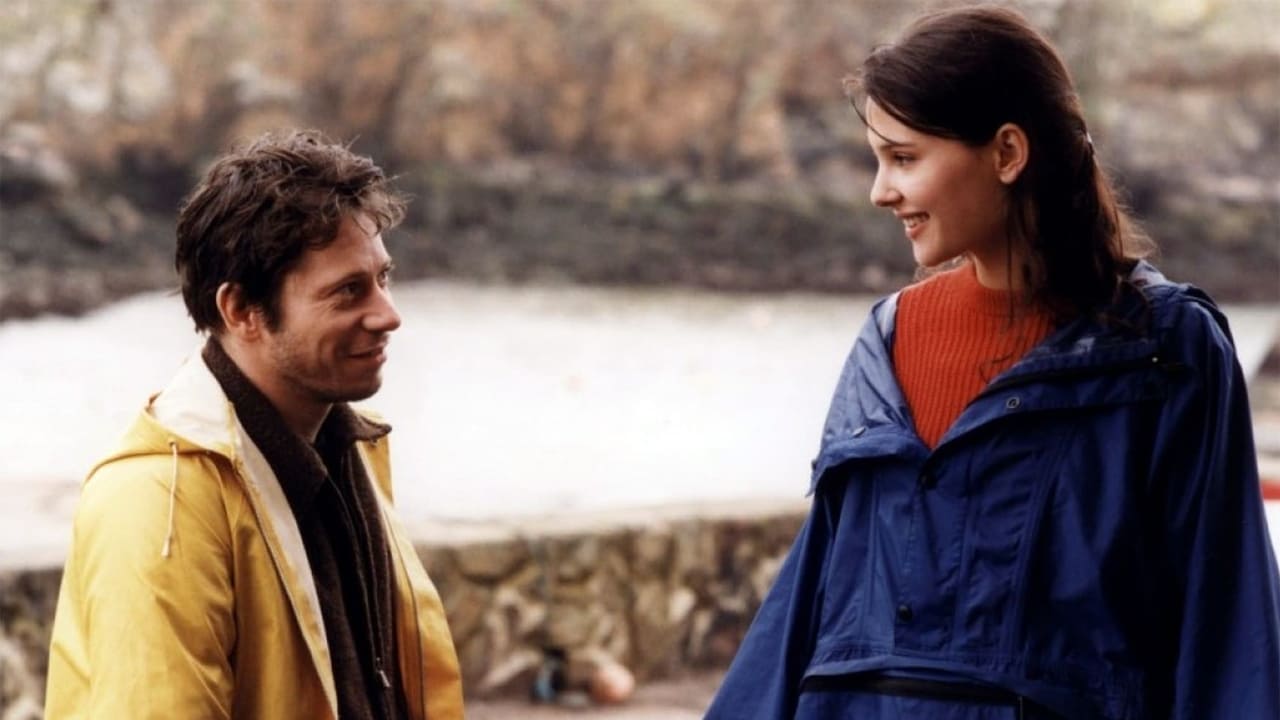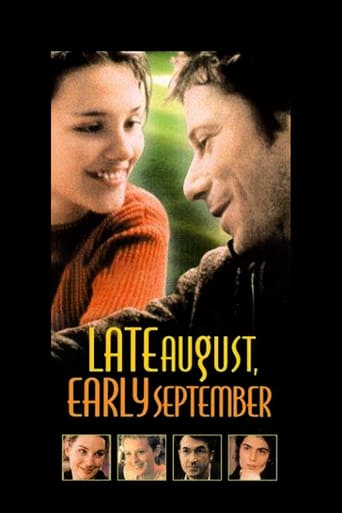

i like french films, especially french films where everybody thinks they are the bomb, nobody works and everybody lounges around drinking coffee. that's my ideal in life, but enough about me. the story is about a bunch of middle aged people who each is going through some sort of crisis. basically they meet each other and discuss their life, not in a direct way, but through inneundo. are they full of themselves, yes, but it's still fun to watch. not the best of film making, but while we rot on this planet and babes like the one you see on this movie are out of our grasp, we can watch this movie. man this review is lame! fudge IMDb! fudge comments!
... View MoreLate August, Early September (1998)Olivier Assayas created a wonderful movie about emotions about feelings, love friendship and death. How can he develop so many multidimensional characters in just one movie, show such a complexity of emotions? We are far from the mediocre habitual (French) movie that piles up betrayal and flat pretty faces. Maybe because the places, the light are familiar to me, it all feel so real, the situations are realistic and the characters exist outside the field of the camera. Beautiful music by Ali Farka Touré and amongst an excellent cast Virginie Ledoyen performs like we could never have suspected from her mediocre acting in 'The Beach' or 'Bon Voyage' Most people will not like that movie but this is the best I have seen this year.
... View MoreLate August, Early September is a movie that will stay with me because it didn't make me obsessed over it right after i saw it. In fact, as time passed, I realized 'gee, the last best time I had with a movie was Fin Aout". So I saw it again, took a deep breathe, and realized it really was a rare, marvelous movie that I feel lucky and nourished to see.I'm suprised that noyone was asking where the music in the movie came from. Well, in case you just saw it and wondered really hard like i did, all the music that was thematiclly featured are by a south African music group called Ali Farka Toure, all the songs are from their album "The Source", and the songs are---(for the opening and the motorbike) "Goye Kur", (for Virginie Ledoyen's threesome scene) "Hawa Dolo", (for Vera's theme, the closing and many parts, the essential theme) "Cinquante Six". I'm utterly moved at seeing Olivier Assayas accomplishment. The lingering, graceful, and intricate portrayal of modern people, throughly, relevantly modern. His water-color painting, which it's moods unexpectedly stay with you after seeing the film. The chosen characters and the bold realities of their conceptions sort of leave me caring about things again. The film showed me processes of natural acceptances and natural complications in life, not mimicking it, just tip toeing through it, yet the character's lives seems to always be existing and experiencing itself in between or before the time frames of the film and so on, so forth. I took that swift, bitter-sweet feeling inside me and kept thinking about the beautiful credits. I kept feeling pleased at how I get to see charcters having been so tormented but keeping so much in, a state that uncannily comforts a lot of my trivial, constant, day to day basis state of mind. Assayas is an auteur, in a really modern sense. He writes his own things, which guarantees his vitality. I have utter faith in him and I'm grateful that his films are made, just there, living.
... View MoreIn many ways, FIN AOUT, DEBUT DECEMBRE is a dismaying and disappointing experience. Assayas' IRMA VEP is the best French film of the last quarter century; thematically rich, stylistically remarkable, emotionally devastating. FIN AOUT is, in comparison, a rather drab handheld take on Eric Rohmer, filled with dull, aimless, middle-class intellectuals who have such 'financial problems' that they get their uncle to lend them his country villa; they whinge and emote in the most banal terms, in a plot that says nothing, and goes nowhere.This very drabness seems to be the film's theme. Although the title is very specific about time and the seasons, the film itself seems to exist in a timeless vacuum. Each episode has a temporal subtitle (e.g. 'six months later'), but no month is ever specified, and could therefore be any or none. This is not the film's failing, but that of the characters, who are locked in their own solipsism, flailing desperately, but unable to escape.Gabriel says of Adrien, the writer, that he was minor because he could only see the world from his limited viewpoint, but this is a much more general malaise - all the talk about friendship can't hide the fact that each character is fatally limited in perception of others, because of obsession with self (figured in the cramped interiors. The trips to the country are literally bursts of fresh air). This doesn't mean that Assayas isn't generous with his characters; he is probably kinder than some of them deserve (Gabriel in particular needs a good shaking). The search for an apartment, therefore, is not a trite subject - these rootless characters, forming their own community, are so desperate for a sense of place, home, that they search everywhere for it: the country, abroad, the past, death.FIN AOUT has in common with IRMA VEP a concern with the crisis of expression in this era of post-modernism. The crucial figure here is the writer, significantly a receptacle of death (the funeral is becoming a recurring motif in modern French cinema, as in THOSE WHO LOVE ME TAKE THE TRAIN); focus for all the other characters.The question is: in an age of pastiche and reproduction, is it possible to insist on authentic personal expression (the film's structure focuses on shifting series of pairs: uneasy doublings and reproductions). And does it matter that this person (both the director in IRMA VEP, and the writer here) is rather objectionable as a human being? Is the insistence on the personal elitist and restrictive?In IRMA VEP, these questions were urgently juggled up to the end, with no clear answers. Here, the writer is unrecognised until he dies, perhaps confirming our decadent reliance on the past, and our inability to come to terms with and express the present (although even this is undermined; as his publisher remarks on his perceived success, 'I wouldn't go that far'). Unlike the director in IRMA VEP, we get no example of Adrien's work, save a self-serving and cliched letter (significantly breaking up a relationship of the May/December type that has nearly killed French cinema). There is no transcendental moment, like the final sequence of IRMA VEP; in essence an archetypal post-modern artefact - a fragmentary, abandoned, incomplete, distorted, scratchy, uncontextualised piece of film; a haunting palimpsest from another age (a call to return to the beginnings of cinema, when possibilities were endless, before ossifying into the codes we are stuck with now?), it is also the locus for Assayas' faith in cinema, personal expression and emotion. This issue is left rather vague here, because we have no evidence with which to judge.Well, except this film, of course. It is this that raises the film - Assayas' complete, mature mastery of the medium. Although his material is banal, he electrifies and enlivens it with his style: the fluidity of his camera movements and editing; his emotional use of colour, light and space; his mastery of the techniques of melodrama; his intimate ability to capture, and make profound, every seemingly trivial, gesture; his enlarging every detail to convey and enrich meaning.Chris Darke has called FIN AOUT a cubist film, but it seems to me more like an obsessive Monet serial: the characters and place, for all their narrative perambulations, never seem to change, or resolve the problems that opened the film (even if they leave somewhere, it's back to somewhere they've been before), but Assayas' impressionistic eye, in capturing authentically the moment, asserts the beauty and depth of the transitory.In fact, the film's nearest comparisons, for all its cinematic brilliance, might be literary - especially Proust and Beckett - in its avoidance of the dramatic (the main death occurs off-screen) in favour of the phatic, the continuous and the elliptical, giving a truer account of lives dominated by lack (the film's opening credits have the actors' names split apart, figuring the personality crises that make up its content).I have been using a lot of superlatives, and here's another. Assayas is, along with Tim Burton, Takeshi Kitano and Wong Kar-Wai, the greatest director in the world: he has often been compared to the latter, although he can't quite reach Wong's offhand melancholy poetry just yet. FIN AOUT, than, is his HAPPY TOGETHER, an absolutely astonishing example of cinematic authority wasted on a rather monotonous psychodrama.
... View More